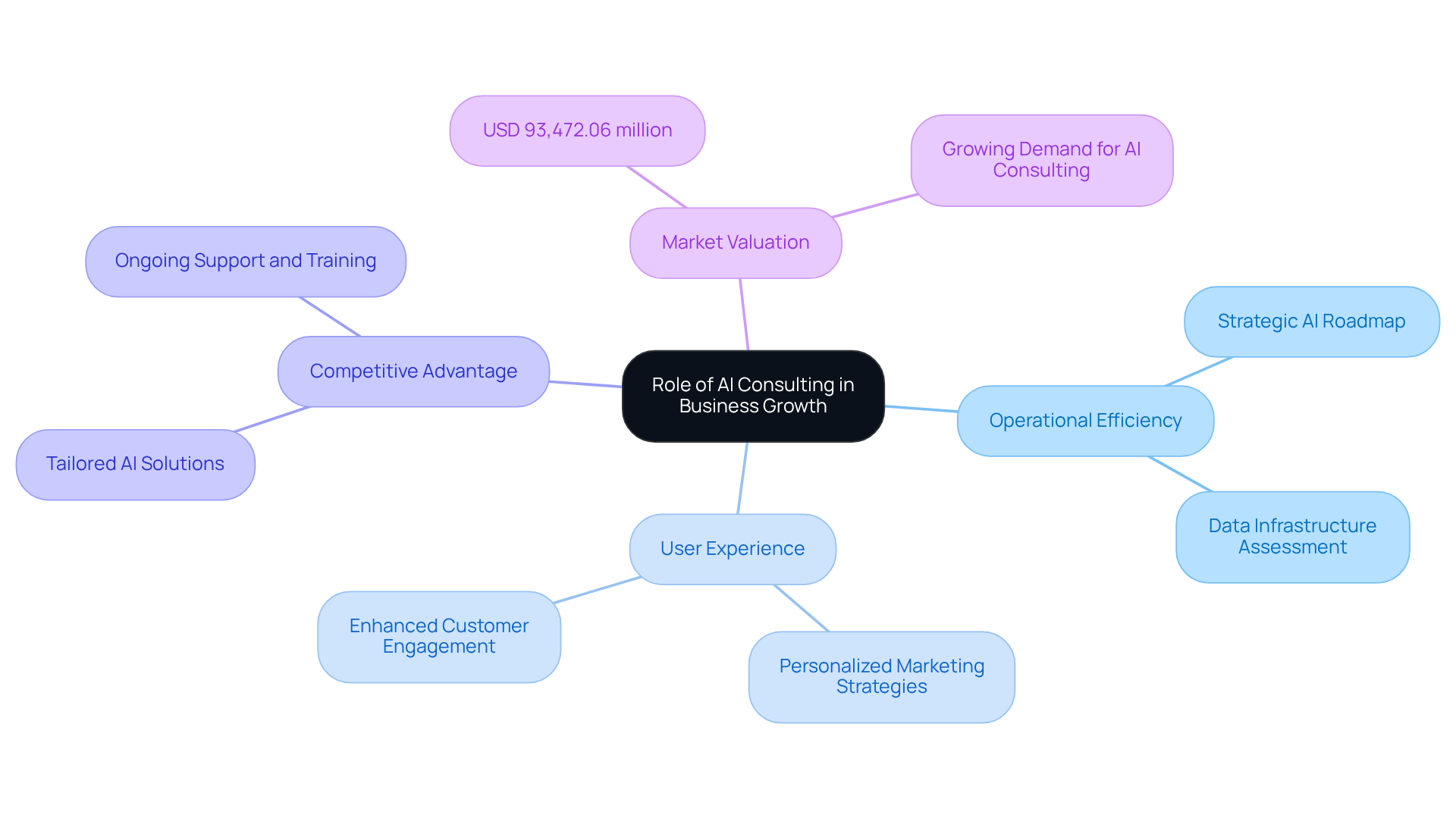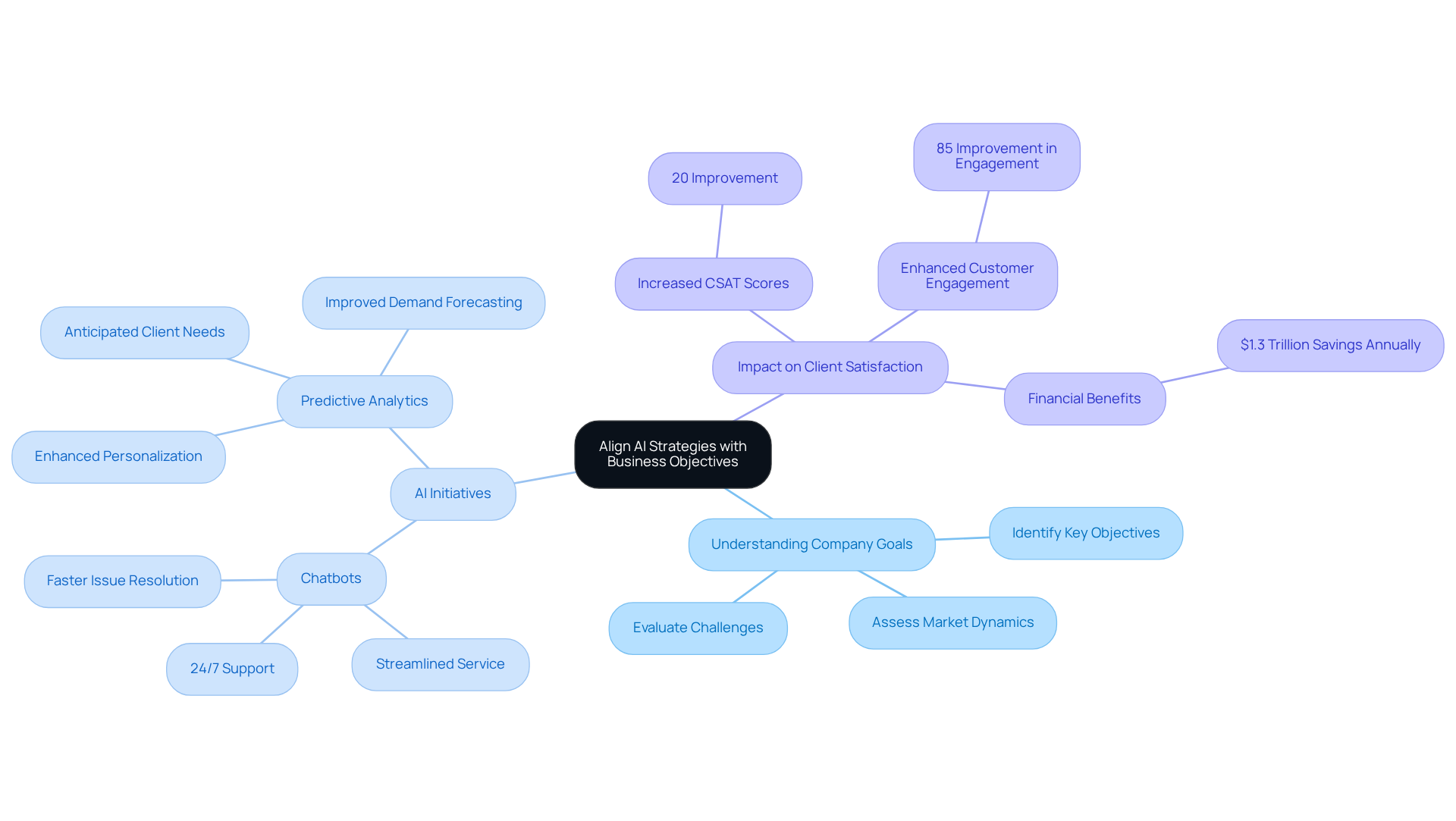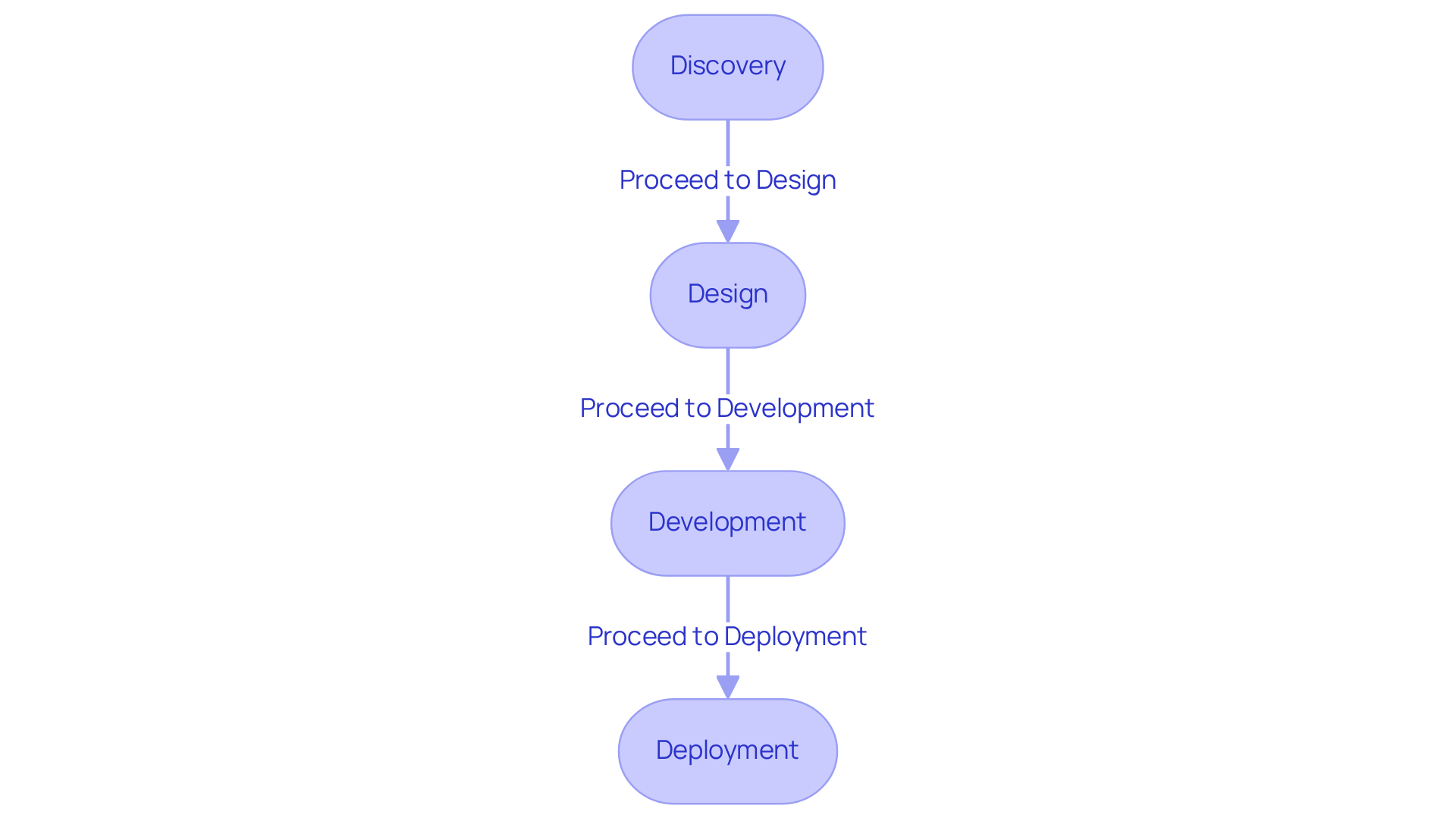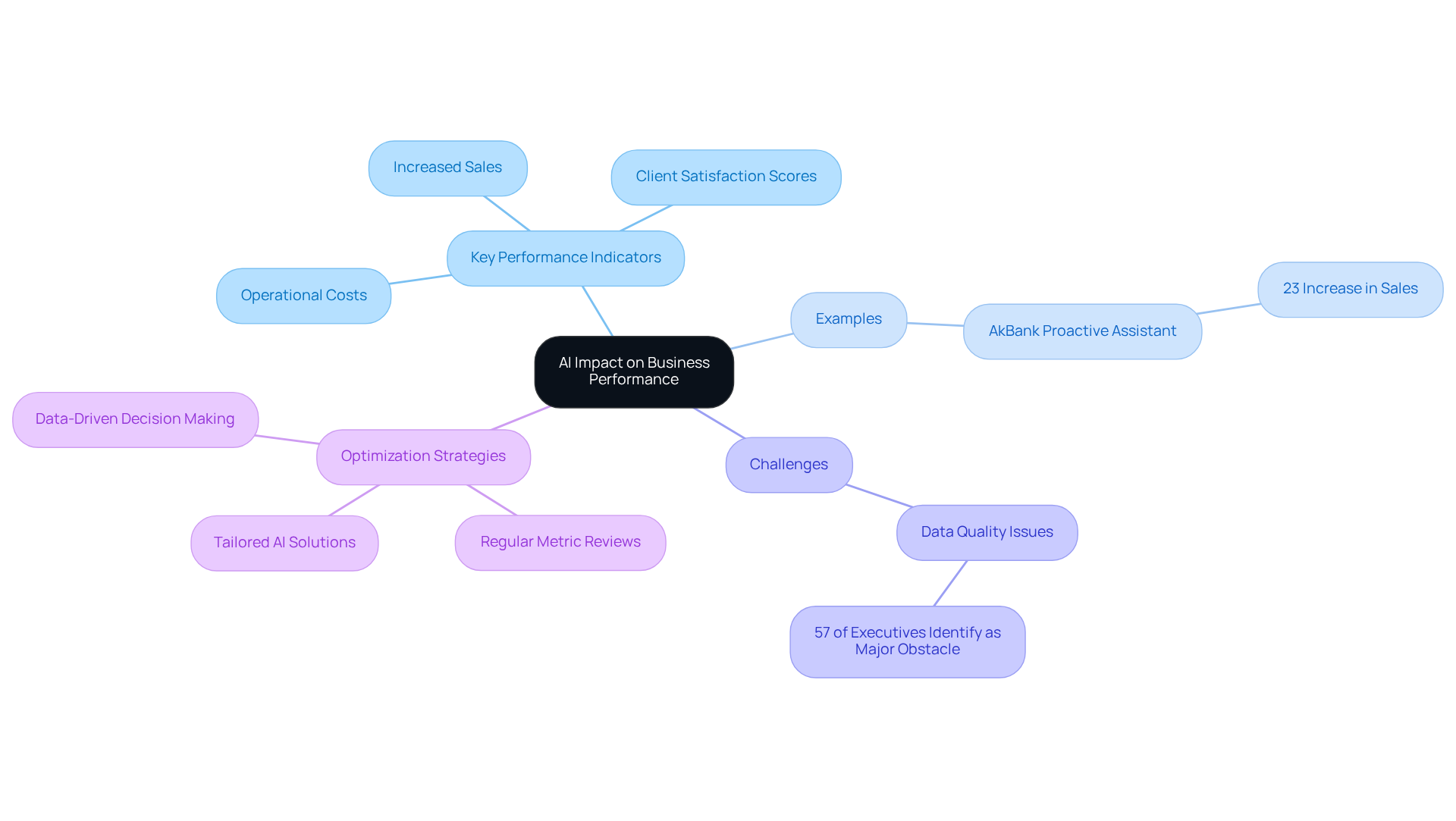AI
our blog
4 Key Practices for Effective Artificial Intelligence Consulting Services

Overview
The article delineates four essential practices for effective artificial intelligence consulting services, critical for businesses seeking to harness AI for growth and innovation. These practices encompass:
- The alignment of AI strategies with overarching business objectives
- The implementation of AI solutions through a structured methodology
- The measurement and optimization of AI's impact on performance
Each practice is reinforced by illustrative examples and metrics that showcase the tangible benefits of AI consulting, particularly in enhancing operational efficiency and customer satisfaction. By adopting these practices, organizations can not only navigate the complexities of AI integration but also drive substantial improvements in their operational frameworks.
Introduction
Artificial intelligence has emerged as a transformative force for businesses striving to excel in an increasingly competitive landscape. As organizations endeavor to harness AI for operational efficiency and improved customer experiences, the significance of AI consulting services becomes critical. This article explores four essential practices that can empower businesses to seamlessly integrate AI strategies that align with their objectives.
However, with the swift evolution of technology, how can companies ensure that their AI initiatives not only address immediate needs but also foster sustainable growth over time?
Understand the Role of AI Consulting in Business Growth
Artificial intelligence consulting services are indispensable for businesses seeking to harness artificial intelligence to drive growth and innovation. By offering specialized expertise, AI consultants empower organizations to pinpoint areas where AI can significantly enhance operational efficiency, elevate user experiences, and establish competitive advantages.
For instance, in the retail sector, an AI consultant may scrutinize customer behavior data to develop personalized marketing strategies, leading to increased sales and enhanced customer loyalty. This strategic approach not only yields immediate results but also equips enterprises for sustainable growth in a progressively competitive landscape.
Industry leaders assert that investing in AI consulting transcends a mere technical choice; it represents a transformative strategy capable of redefining corporate operations and innovation. Notably, only 1 percent of corporate leaders report that their firms have achieved AI maturity, underscoring the crucial role of artificial intelligence consulting services in advancing their organizational AI initiatives.
Furthermore, the global market for artificial intelligence consulting services reached a valuation of USD 93,472.06 million in 2022, illustrating the escalating demand for these services. As John Courtney articulates, AI consultants bridge the gap between traditional strategies and the innovative possibilities of AI, making their role vital. Additionally, the ongoing support and training provided by AI consultants post-implementation are critical for ensuring the long-term success of AI projects.

Align AI Strategies with Business Objectives
Aligning AI efforts with a company's goals is essential for maximizing their effectiveness. A comprehensive understanding of the company's goals, challenges, and market dynamics is crucial. For instance, if improving client satisfaction is a priority, AI strategies might encompass:
- Deploying chatbots to streamline service
- Utilizing predictive analytics to better anticipate client needs
By ensuring that AI projects are directly connected to organizational goals, entities can concentrate on initiatives that yield substantial value and quantifiable results. This alignment not only enhances client satisfaction metrics—evidenced by the fact that AI-driven strategies boost CSAT scores by 20% on average, and that 70% of organizations utilizing AI report improved client interactions—but also positions firms to leverage AI as a core driver of operational efficiency and growth.
As McKinsey points out, "CIOs must lead the development of a comprehensive AI strategy that aligns with organizational objectives," underscoring that the integration of AI into strategic plans is becoming essential for maintaining competitive advantage in today's rapidly evolving market landscape. Furthermore, AI tools lead to a 50% rise in net promoter scores (NPS) globally, demonstrating the beneficial effect of AI on client satisfaction and organizational success.
By aligning AI projects with corporate objectives, companies can not only improve customer experiences but also achieve significant financial advantages, with firms saving an estimated $1.3 trillion each year by utilizing AI for customer service.

Implement AI Solutions with a Structured Approach
Implementing AI solutions necessitates a structured approach to ensure efficient and effective project execution. This process typically encompasses several critical phases:
-
Discovery: This initial phase focuses on identifying the specific problem to be addressed and gathering relevant data. A thorough discovery process is essential for understanding market opportunities and user needs, ultimately informing the project's direction. Significantly, organizations with over 50 data science projects frequently discover that merely 1 or 2 generate daily value, highlighting the significance of this stage.
-
Design: In this phase, a prototype or model is developed to tackle the identified problem. Rapid prototyping and iteration based on user feedback are crucial here, allowing teams to refine their solutions before full-scale development.
-
Development: This phase involves building the AI solution, ensuring it integrates seamlessly with existing systems. Effective integration is vital for operational efficiency, as demonstrated by a leading refinery that reduced overdue work by 94% and saved $8 million through optimized maintenance control systems.
-
Deployment: The final phase entails launching the solution and closely monitoring its performance. Ongoing assessment aids companies in adapting and improving their AI tools, ensuring they provide the desired business value. For example, a South American aviation leader realized a 4:1 return on investment by enhancing productivity and lowering expenses through strategic AI projects.
By following this structured method, entities can reduce the risks linked to AI implementation and significantly enhance the chances of attaining successful outcomes. As noted by industry experts, 'The first question you should ask yourself when building ML is; can we do it without ML?' This highlights the necessity of a thoughtful approach to AI projects.

Measure and Optimize AI Impact on Business Performance
To guarantee that AI initiatives yield measurable benefits, organizations must establish robust metrics to assess their impact on performance. Key performance indicators (KPIs) can encompass a variety of metrics, such as increased sales, enhanced client satisfaction scores, and reduced operational costs. For instance, AkBank's Proactive Assistant project achieved an impressive 23% increase in sales, aligning seamlessly with their strategic objectives for engagement and growth. Regular reviews of these metrics empower businesses to identify optimization opportunities and make informed, data-driven decisions to enhance their AI solutions.
Specific KPIs, including engagement rates and Net Promoter Score (NPS) surveys, offer valuable insights into customer satisfaction and overall performance. If an AI-driven marketing campaign falls short of expectations, a thorough analysis of performance data can reveal insights that guide adjustments in targeting or messaging, ultimately leading to improved outcomes. Furthermore, companies must recognize the challenges associated with data quality, as highlighted by 57% of executives in a recent survey, which can hinder the effectiveness of AI initiatives.
Establishing a comprehensive set of KPIs enables organizations to monitor the multifaceted impact of AI across various dimensions, ensuring alignment with strategic objectives and fostering continuous improvement.

Conclusion
Artificial intelligence consulting services are essential for businesses aiming to unlock the full potential of AI, driving growth and innovation. By leveraging specialized expertise, AI consultants empower organizations to identify key areas for improvement, ultimately enhancing operational efficiency and user experiences. This transformative approach not only delivers immediate benefits but also positions companies for long-term success in an increasingly competitive landscape.
Throughout this article, several critical practices for effective AI consulting have been emphasized. These include:
- Aligning AI strategies with business objectives to maximize value
- Implementing solutions through a structured approach that minimizes risks
- Establishing robust metrics to measure and optimize the impact of AI initiatives
Each of these practices contributes to a comprehensive understanding of how AI can be strategically integrated into business operations, ensuring that organizations can achieve significant financial and operational advantages.
In a world where AI is becoming integral to business success, adopting these best practices is essential. Organizations must recognize the importance of investing in AI consulting services to navigate the complexities of AI implementation effectively. By doing so, businesses can enhance their operational capabilities and position themselves as leaders in innovation and customer satisfaction. Embracing AI as a core component of strategic planning will undoubtedly empower organizations to thrive in the digital age.









